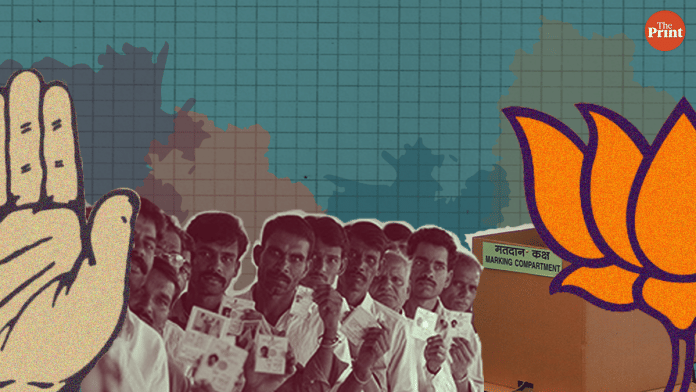All major political parties in the state elections in Rajasthan, Madhya Pradesh, Telangana, Chhattisgarh and Mizoram have promised freebies and doles during the campaigns – ranging from laptops to smartphones, tiffin boxes to unemployment allowances.
ThePrint asks: Can Congress-BJP sway state polls with freebies or are they failing to read voters’ minds?
Luring voters with freebies is more democratic than hate, intimidation
 Rasheed Kidwai
Rasheed Kidwai
Visiting Fellow, Observer Research Foundation
Freebies are integral part of our political culture. Populist measures like two-Rupee rice, laptops and farmers’ loan waivers have had a history of turning around poll outcome.
Politically, it is perfectly democratic to lure voters with populist measures than hate, intimidation or discrimination. Some of the southern states who have a political tradition of freebies, have much better socio-economic indicators than their northern or eastern counterparts.
It is sagacity of voters to opt for one party or the other. Freebies, in some ways, are just a glimpse into the social or economic security that should have been in place anyway in a welfare state. When the state is unable to provide basics like clean drinking water, electricity, schools and security in a society that is using purified water, invertor-generators and private security services, the voter will take whatever is being offered.
For some, it is fashionable to criticise freebies on the grounds that it drains the treasury. For instance, the average debt on every resident of Madhya Pradesh is around Rs 13000. But then, it has more to do with our faulty federal structure and tax-revenue sharing arrangements. Regulatory and advisory bodies like Niti Aayog have been either wilful partners or mute spectators. There will never be a consensus among the national parties like the Congress and BJP to discourage freebies because they are the easiest way to win elections.
The only losers in this never-ending promises for freebies are independent candidates and smaller parties. But then first-past-the-post system is inherently programmed to favour, “Winner takes it all” or those who have concentrated support bases.
Last-minute announcement of freebies reflects desperation
 Sandeep Shastri
Sandeep Shastri
National co-ordinator, Lokniti Network
Announcement of freebies and sops by political parties reflects a desperation on their part to swing the voter in their favour, especially in a tight race. At another level, it is indicative of the inability of the party to attract support on the basis of their track record of performance and service delivery.
Do such last minute moves to swing the sentiment in their favour work? Past experience indicates no such proof of voters being influenced by such a ‘promise of largesse’. Last time, when Rajasthan went to the polls, Congress’ Ashok Gehlot government introduced a slew of last minute schemes but this did not prevent the electorate from voting out the Congress. What appears to clearly impact is tangible proof on the ground of successful implementation of policies and schemes by the party in power early in its term in office. Any progressive welfare programme successfully introduced during the first three years in power, is actually experienced by voters well before the next election and often results in a positive endorsement of the ruling party. Nitish Kumar’s government in Bihar, Jayalalithaa winning a surprise second term in Tamil Nadu the last time around, the victory of Raman Singh in Chattisgarh in 2013 and the image of the AAP government in Delhi are all pointers to this trend.
Over the years, the Indian voter has become mature enough not to be swayed by the last minutes promises parties hold out. A large chunk of the voting population take the call on whom to vote for much before the election day. Even those who are weighing their options and possibly make this decision at the last minute rarely swayed by the desperate sops promised by parties.
It’s a mistake to think voters do not like freebies
 Sanjay Kumar
Sanjay Kumar
Director, CSDS
Freebies alone can’t win election for any political party, but it is being effectively used as an additional tool by political parties for mobilization of votes in its favour. Voters who receive freebies from a particular party, do tend to vote for that party but even this preference is limited. If freebies alone were enough for political parties to win election, then the role of the electioneering and campaigning would have declined over last few years. But we don’t see that happening. Campaigning is more intense now compared to the past even as freebies grow.
We would be making a mistake if we believe that political parties fail to read voters mind. Voters in general do not have any serious objection to freebies and welcome them. After all, customers like buy-one-get-one-free along with products we purchase.
Some voters may raise concern, but a huge majority of voters hardly have any issues with freebies. But one should not make a mistake of thinking of Indian voters as ignorant or fools. Since it is being offered by almost all political parties, voters would accept them from everyone (if offered). But they finally make their informed choices about which party/candidate to vote for based on several other considerations. Freebies maybe just one of those.
Freebies vitiate the purity of election process and disturb level-playing field
 S.K. Mendiratta
S.K. Mendiratta
Former legal advisor, Election Commission of India
India’s Supreme Court has categorically observed that freebies offered by political parties vitiate the purity of election process and disturb level playing field. As desired by Supreme Court, Election Commission has issued guidelines that parties should observe and follow while issuing their manifestos.
I am sure the Election Commission of India will look into the manifestos of all parties to examine whether ECI guidelines have been duly observed or not.
However, I am of the view that party manifestos should be issued much earlier and not just a few days before the date of poll, as is now being done. It is an innovative way of defeating not only the spirit but also the letter of the Model Code of Conduct and rendering its laudable objectives meaningless.
Earlier, manifestos were issued much in advance. That is why SC observed that MCC will apply even in respect of those manifestos, which were issued before the formal announcement of election schedule by ECI when the MCC normally comes into force.
Neither Congress nor BJP think that freebies alone can win them elections
 Ruhi Tewari
Ruhi Tewari
Associate editor, ThePrint
No voter today votes on the promise of some doles or imaginary hand-outs by political parties if voted to power. The voter isn’t foolish enough to vote on the basis of promises, which may or may not be fulfilled.
The motivations for a voter’s preference are far more purposive — sometimes strategic and sometimes purely sentiment-based. A voter may press the EVM button based on a yearning for change – like say in Tripura that was ruled by the Left for decades, or may do so because she/he has more faith in the current dispensation than in the alternative, like in Gujarat. A voter may vote based on aspiration and a promise of an overall better future, like they did for Narendra Modi in the 2014 Lok Sabha polls, or for a leader whom they feel convinced about rallying behind, again like the Uttar Pradesh voter did for Modi in 2017. A voter may also vote on far more strategic considerations, giving primacy to issues of caste, religion and personal benefits.
But for any of the above, a political party needs a combined strategy of top down effective campaigns with bottom-up organisation structures that have a pervasive presence on the ground. And political parties – Congress, BJP or others – are more than aware of this. They promise freebies, yes, but it isn’t as if they think that alone can win them elections. There is a reason why a vigorous campaign by the top leadership of parties is given utmost importance, as is the focus on building an organisation machinery.
The pre-poll sop announcements are mere garnishes on an otherwise carefully readied electoral cocktail.
By Fatima Khan, journalist at ThePrint. You can follow her on twitter @khanthefatima.






